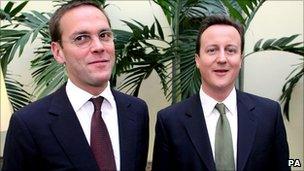A new era for politics and the media?
- Published
- comments

A new era will require transparency by politicians
On the morning after the night the Commons broke the spell of Murdoch some are hailing a new era.
Never again, they say, will our political leaders be swayed by the charms and the threats of Rupert or James or Rebekah or, indeed, the owner or boss or editor of any paper.
To which I say: Clear your head, stop and think and stop fantasising. Politicians and the press are fated to be locked perpetually in a loveless embrace.
Our elected representatives crave favourable coverage. Newspapers are bought by men not to make money but for power and influence. It has always been thus and politicians have always resented it.
Back in the 1930s a Tory prime minister, Stanley Baldwin, condemned the press for wanting "power without responsibility - the prerogative of the harlot throughout the ages".
The tension has, if anything, got worse since then because politicians feel less and less able to get their message to the electorate unmediated whilst media organisations need and want legal and regulatory favours to allow them to expand their empires - buying other papers, expanding into TV or online - and to limit their competitors.
Gordon Brown's speech yesterday - more a roar of pain and anger - perfectly illustrated the problem.
He insisted that he had stood up to the Murdochs and that he and his ministers resisted demands for the BBC licence fee to be cut and its activities scaled back and for the regulator Ofcom to be neutered.
Gordon Brown told MPs he called for a judge-led inquiry into hacking when he was PM
He pointed out that he had been the target of attacks - from News International papers - the most painful of which was the suggestion that he was responsible for and uncaring about the death of soldiers in Afghanistan. All fair points.
However, he could not bring himself to do what both Ed Miliband and David Cameron have done - to admit that politicians, including himself, had got too close to the Murdochs in the hope of favours. He merely asserted that on coming to office he had tried to make friends in order to pursue the policies he believed in.
There can be no doubting that he tried very very hard to make friends.
When I made a radio profile of Gordon Brown before he became Prime Minister, his office suggested I interview a Murdoch lieutenant and Gordon admirer, Irwin Stelzer.
Rupert Murdoch disliked coming to Downing Street in those days, according to someone who worked with him, because Gordon would always insist that he as well as Tony Blair should be granted a meeting.
Rupert and Gordon, I was told repeatedly, shared a Presbyterian morality, a belief in work and mistrust of privilege.
The first person to call Andy Coulson to commiserate when he resigned from the News of the World was Gordon Brown (at least according to Mr Coulson).
As prime minister he went to Rebekah Brooks wedding and his wife Sarah invited Brooks to a "slumber party" at Chequers. And so on and so on.
My point is not to condemn Gordon Brown.
He made a powerful attack yesterday on the immorality and illegality of abuses by the press.
What's more, he only did what Tony Blair had done and what David Cameron went on to do. However, a new era will depend on politicians not simply condemning the press or promising to be virtuous in future.
It will depend, above all, on transparency in their dealings with those they can't live without but find it agonisingly painful at time to live with.